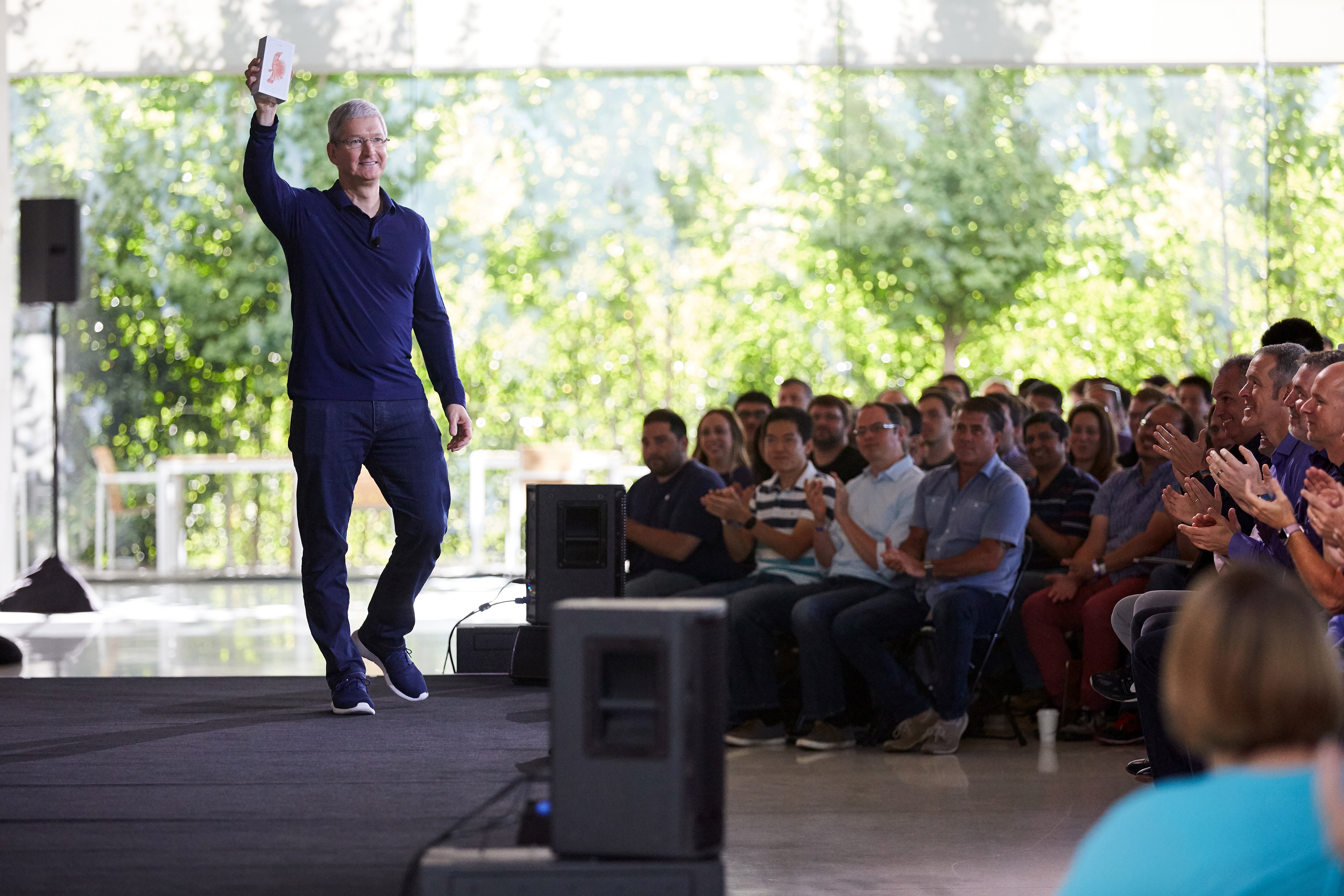Since taking over Apple, Tim Cook has achieved incredible financial performance. Under his management, Apple became the most valuable company in the world (market value), making a mountain of money never imagined at the time when Steve Jobs was the leading executive of Ma ($ 108.2 billion in 2011 vs. US $ 215.7 billion in 2016).
 Tim Cook celebrating the billionth iPhone sold
Tim Cook celebrating the billionth iPhone soldOn the other hand, a good part of this success comes from the iPhone, a product idealized and conceived in Jobs' gesture. Cook, according to some, simply did what he knows best: he took care of the operations so that a great product could reach the maximum possible number of users. For these and others, some (like businessman Steve Blank) like to compare his gesture with that of Steve Ballmer.
Ballmer replaced Bill Gates as Microsoft's CEO and tripled the company's sales. However, under Ballmer's direction, the company missed important opportunities to maintain / extend the dominance of its software (mainly in the mobile world), leaving all that ground to Apple, Google, Facebook (search market) and Amazon (cloud).
Bob Burrough, a former Apple engineer, joins with Blank. And it goes further: for him, as the CNBC , today’s “boring” Apple and has become an “operations company”.
In his opinion, the Apple organization in 2007 (under Jobs) was a mess, an "Old West". He, for example, was hired as a manager specifically to take care of one thing, but during the first two years he only worked on projects that had practically nothing to do with management-related responsibilities. This, according to him, happened because the organization was not the priority; what mattered was the project.
It was the exact opposite of "this is not my job", something like "I'm here to solve any problem that comes up, regardless of my position or who I answer to". Was it difficult? Yes, but for Burrough, the bonus was even greater for you really making an impact on the particular product you were working on.
 From left to right: Phil Schiller, Tony Fadell, Jony Ive, Steve Jobs, Scott Forstall and Edy Cue
From left to right: Phil Schiller, Tony Fadell, Jony Ive, Steve Jobs, Scott Forstall and Edy CueToday, that has changed. According to Burrough (who also worked under Cook), the dynamics at the company are clearly and distinctly different, much more like the work he did at Palm. There, the teams were highly organizational (respected a hierarchy), with responsibilities well organized. "There was a clear feeling that each person had a clear responsibility and rarely deviated from it." When you sought help from someone to solve a problem, for example, the answer “this at my job” was quite common.
Burrough used Scott Forstall's resignation, until then the iOS boss, as a clear example of his theory. According to him, in the administration of Jobs several conflicts arose due to people's concern with the product. And, many times, it is these conflicts that make the wheel spin and we see products like the iPhone being created. Managing these conflicts, this competitiveness that exists between people and teams, however, is not a simple task.
. @ Mbrawler Question: If conflict comes from caring about a product, and Tim Cook eliminated conflict, did Tim Cook eliminate caring?
– (@bob_burrough) January 17, 2017
@Mbrawler Question: If the conflict comes from caring about a product and Tim Cook eliminates the conflict, did Tim Cook eliminate caring (about the product)?
Jobs, despite instigating this environment, controlled it in a unique way. The proof of this is precisely in Forstall's dismissal.
Wrong !!! There was never a competition. We, together, were searching for the best solution. Steve asked us to test all the possibilities… https://t.co/DNkT2WZnqV
– Tony Fadell (@tfadell) January 11, 2017
Wrong!!! There was never a competition. We, together, were looking for the best solution. Steve asked us to test all the possibilities
Countering this claim that Jobs instigated competition, a certain internal tension, Fadell said that this is history and that the former CEO did not promote such a thing within the company. Only that Forstall's dismissal, as I said, shows that it is not so.
When the executive left Apple, we saw several reports of conflicts (one with Fadell, the other with Bob Mansfield). Although the atmosphere between them apparently was not good, these executives were able to work under the same roof under Jobs' management and the result was precisely the creation of incredible products.
Listen to Steve Jobs himself explain the purpose of conflict. @charlesarthur pic.twitter/393DopEuWT
– (@bob_burrough) January 17, 2017
Jobs explaining why tension, conflict and internal competition if used correctly can be beneficial.
On the other hand, we know that Cook is completely different from Jobs and it makes no sense at all that he wants to run the company in the same way as his predecessor.
Is Burrough right in saying that Apple has become a "boring" operating company? No doubt Cook still has a few years to show service at Apple's helm. And we face some interesting battles in which Apple must show its value, as in the field of artificial intelligence, in autonomous vehicles, augmented reality, among others.
(via Patently Apple)
